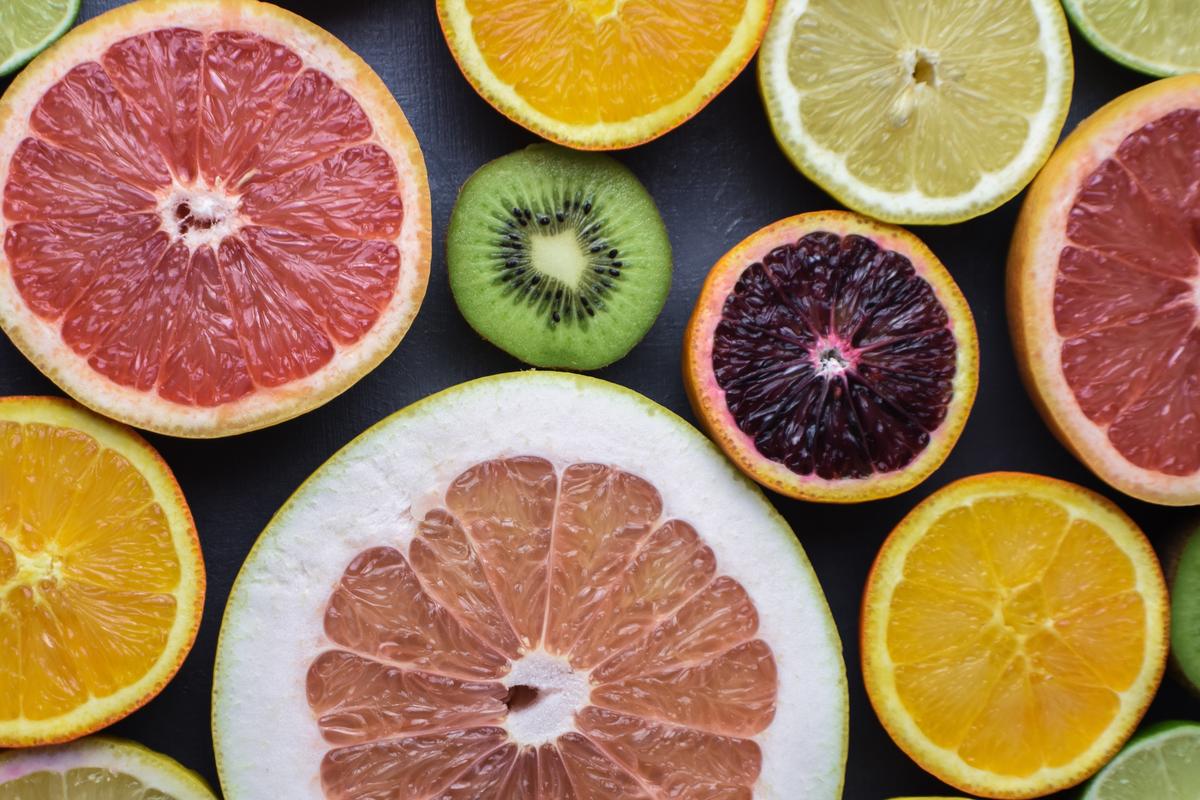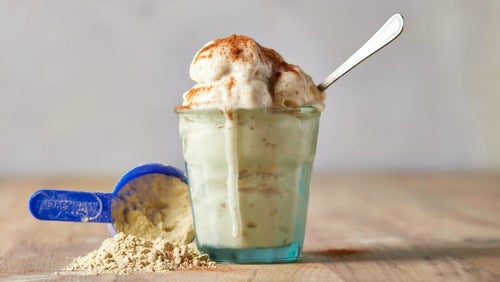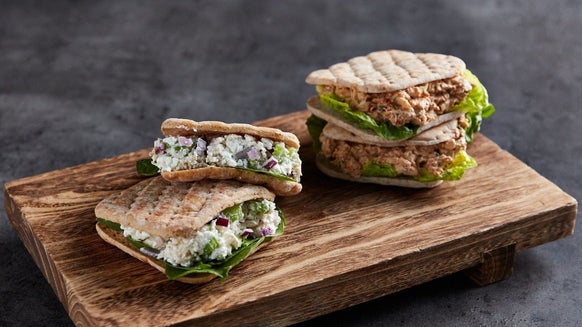
Carbohydrates come in many forms — wholegrains, starchy vegetables, dairy products, and fruits. Fruits are like nature’s sweet treat. They’re naturally sweet, but also packed with water, fibre, vitamins, and minerals. However, if you’re trying to follow a low-carbohydrate or low-sugar diet, some fruits are much lower in sugar than others. Here’s a list of the best low-sugar fruit options to satisfy your sweet tooth and nutritional needs.
1. Lemons and Limes: 5g sugar per cup1
These two might be obvious choices for low sugar fruits due to their tart flavour. While lemons and limes are not fruit that you typically eat whole, you can use them to flavour food and beverages while adding minimal sugar and calories. Lemon and lime zest contain concentrated flavours that work well in cooking and baking, while their juice is the perfect zesty finish for meats, fish, and other main dishes. As part of the citrus family, they are high in vitamin C and other antioxidants that can have protective health effects.
2. Blackberries: 7g sugar per cup1
Many members of the berry family are low in sugar and high in antioxidants. Typically, the darker, richer the colour of a fruit or vegetable, the higher they are in anthocyanin pigments (an antioxidant), and blackberries are a very dark purple, packed with nutrition. They’re very high in vitamins C and K, which play roles in immunity and blood clotting.
3. Strawberries: 7g per cup1
Similar to the sugar content of blackberries, strawberries typically taste sweeter but are still low in sugar. They are also packed with vitamin C (which boosts immunity), folate (crucial for women who plan to have children), and potassium (important in heart health). Strawberries are packed with water and fibre, making them low in calories and sugar, perfect for a snack or as part of any meal.
4. Raspberries: 5g per cup1
Raspberries are similar in nutrient content and health benefits to strawberries and blackberries, but are even lower in sugar. Like strawberries, they are high in vitamins C, K, and manganese. Their pink/red colour indicates a high antioxidant content that is not quite as high as that of blackberries.
5. Blueberries: 14g per cup1
Blueberries are packed with antioxidants, vitamins, and fibre. Although higher in sugar than raspberries, strawberries, and blackberries, blueberries have the greatest concentration of antioxidants, specifically flavonoids. The flavonoids in blueberries contribute to their disease fighting properties, and give them their deep blue color.2 They are also high in vitamins C and K, like other berries.
6. Cantaloupe: 12g per cup1
Cantaloupe is the fruit that is highest in beta carotene, a carotenoid that is also found in vegetable sources like carrots or red bell peppers. Our bodies convert beta carotene into vitamin A, which is important for eye health, immune health, and red blood cells. It’s also high in vitamin C, actually containing all the vitamin C you need for the day in just one cup.1 Cantaloupe is very high in water content, making it hydrating and low in calories.
7. Honeydew: 14g per cup1
Honeydew is another part of the melon family which, like cantaloupe, is similarly low in sugar and high in vitamin C. Its high potassium content can contribute to heart health by helping reduce blood pressure (along with a low sodium diet).1 Potassium is also a crucial electrolyte for hydration, which works well with the high water content of honeydew to help recover after a sweaty workout.
8. Peaches: 13g per cup1
Peaches are a sweet stone fruit that contain a small amount of sugar, but are also packed with antioxidants. Their high fibre content can help with digestion too. Peaches are a great fruit to slice in half and grill for a naturally low sugar dessert, or to serve with high-protein plain Greek yogurt for a high-fibre, high-protein snack.
9. Plums: 16g per cup1
Similar to the dark blue and purple berries, plums are high in antioxidants, specifically polyphenols. These powerful plant compounds have been shown to have antioxidant effects. Although 16g of sugar per cup is higher than some of the other fruits on this list, their high fibre and water content help to keep their impact on blood sugar levels minimal. While whole plums have a high water content, their dried counterpart, prunes, have a more concentrated sweet flavour. Prunes are natural laxatives, while plums have less of this effect.
10. Apricots: 14g per cup1
The third low-sugar stone fruit in this list is the apricot — similar in appearance (and nutrition) to peaches, but with a similar size and flavour to plums. They contain vitamins A and C, potassium, beta carotene, and flavonoids that can boost immunity and prevent oxidative stress to your cells. They’re also available in a dried form (like prunes), but the whole fruit form gives extra hydration due to their natural water content.
11. Oranges: 17g per cup1
Oranges are known for being high in vitamin C, like other fruits, specifically members of the citrus family. They’re larger than lemons or limes, and have a sweeter flavour, making them popular for juicing. While orange juice is still high in vitamin C, eating a whole orange provides the beneficial fibre, which slows the digestion of the fruit and limits its impact on blood sugar. They’re also easily portable with their thick skin and make for a great on-the-go snack.
12. Grapefruit: 16g per cup1
Grapefruit is another popular citrus fruit with a flavour slightly more tart than oranges, though their nutritional profile is similar. They are high in vitamin C like other members of the citrus family, but they’re the biggest fruit of the group. In addition to vitamin C, they also contain some B vitamins and vitamin A. They are popular for those trying to lose weight, which may be due to their high fibre and water content, making them a filling snack. They were part of a fad “grapefruit diet” many years ago, which led to some research supporting their role in weight loss and other studies which showed that grapefruit alone was not a magic weight loss cure. Regardless of its impact on weight loss, grapefruit is clearly a good option for a low-sugar fruit.3
13. Kiwi: 16g per cup1
Kiwis are a small, nutrient-packed green fruits with an inedible, fuzzy skin. Their unique tart flavour and bright green colour make them a great addition to a fruit salad, or easy snack to eat on their own. Like the other fruits on this list, kiwis are high in vitamin C and other antioxidants that can have protective health effects. It also contains high amounts of vitamin K.
14. Cranberries: 5g per cup1
While not typically considered a common fruit for snacking, cranberries are packed with nutrition, similar to the other fruits in the berry family. They do have a more tart flavour thanks to their low sugar content. They are also high in fibre and have shown a beneficial impact on blood cholesterol levels. When choosing cranberry products or juices, look for those without added sugars. While most of us associate cranberry jelly with Christmas dinner, those homemade dishes are usually packed with sugar. Try using whole cranberries or unsweetened juice to get the health benefits instead.
15. Avocado: <1g per cup1
Avocados are probably not the first food that comes to mind when you think of fruits, but these healthy, fat-packed fruits are about as low sugar as you can find. They’re also high in vitamin K and folic acid, while being very low in overall carbohydrates. The heart-healthy unsaturated fat, as well as potassium they contain, make them a great staple food to incorporate into your meal plan. While not as high in vitamin C as most traditional fruit, they still contain almost 20% of the daily value, along with vitamins B5, B6, and vitamin E.
Take Home Message
All of these low sugar fruits, thanks to their high fibre content, have the potential to improve heart health and improve blood glucose levels. Unlike eating a snack with processed sugars, eating something with fibre and water content slows the digestive process and helps your body use the energy from fruit more efficiently without a major spike in blood sugar. Aiming for 2-4 servings of fruit per day, from different groups and of different colours, is the best way to obtain a well-balanced diet and benefit from all the nutrients these foods have to offer.
READ THIS NEXT:

Tasty 30-Second Protein Ice Cream
All you'll need is a blender and few simple ingredients....

What Is Reverse Dieting?
So, you've lost some weight — what's next?...

Claire is a Registered Dietitian through the Academy of Nutrition and Dietetics and a board-certified Health and Wellness Coach through the International Consortium for Health and Wellness Coaching. She has a Bachelor of Science in Biology and a Master’s degree in Clinical Dietetics and Nutrition from the University of Pittsburgh.
Talking and writing about food and fitness is at the heart of Claire’s ethos as she loves to use her experience to help others meet their health and wellness goals.
Claire is also a certified indoor cycling instructor and loves the mental and physical boost she gets from regular runs and yoga classes. When she’s not keeping fit herself, she’s cheering on her hometown’s sports teams in Pittsburgh, or cooking for her family in the kitchen.
Find out more about Claire’s experience here.
- National Nutrient Database for Standard Reference 1 Release April, 2018. United States Department of Agriculture. Retrieved from: https://ndb.nal.usda.gov/ndb/search/list
- Yao, L. H., Jiang, Y. M., Shi, J., Tomas-Barberan, F. A., Datta, N., Singanusong, R., & Chen, S. S. (2004). Flavonoids in food and their health benefits. Plant foods for human nutrition, 59(3), 113-122.
- Fujioka, K., Greenway, F., Sheard, J., & Ying, Y. (2006). The effects of grapefruit on weight and insulin resistance: relationship to the metabolic syndrome. Journal of medicinal food, 9(1), 49-54.



